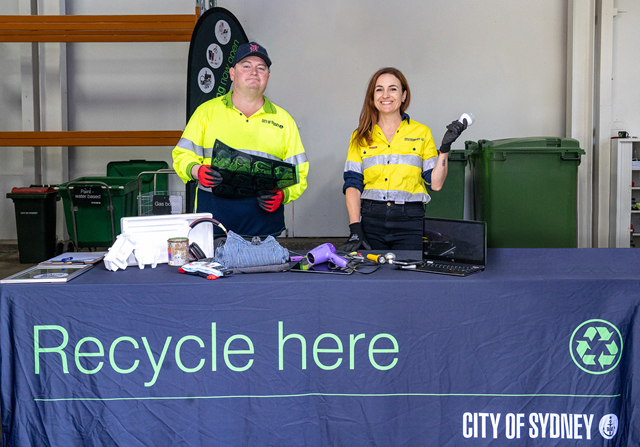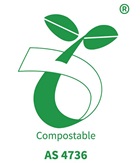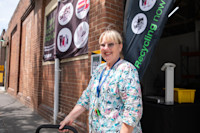Ultimo recycling pop-up
Walk up and drop off worn-out clothes, old electronics, polystyrene, x-ray scans and more. Weekly, free.

Christmas and new year opening hours
Find out when our services and programs will be open over the Christmas and new year period.
Opening hours
Tuesday
2pm to 7pm
A free and easy way to recycle tricky household items.
Walk, ride or link up with public transport to drop off tricky household items at our newest recycling hub.
We accept items that don’t belong in your bins at home like polystyrene, small electronics, batteries, unwearable clothes, x-rays and more. Read the full list of items.
Bring small items you can carry that are less than 15kg. Please make sure items are safe, clean and dry. We reserve the right to refuse items that aren’t deemed acceptable.

Check you’re a local resident
We can only accept items from City of Sydney residents.
Before dropping off your items, you’ll need to fill in a short survey and provide your address.
We don’t accept items from businesses.
Visit our recycling pop-up during opening hours
We’re open Tuesdays, 2pm to 7pm.
When you arrive, please line up and complete our check-in survey. Wait for our employees to help you unpack and sort your items for recycling. You must take home any items that are not accepted.
If you arrive outside of opening hours, don’t leave any items unattended. Items left outside opening hours will be treated as illegal dumping and you may be fined.
Limited access for cars
The Ultimo recycling pop-up is not a drive-through. If you come by car, please park on the street and bring your items to us.
It can be difficult to find a parking spot nearby. We have one 5-minute drop-off parking spot in front of the facility.
Please don’t drive into or block any driveways.
✔️ What you can drop off
❌ What you can’t drop off
Spread the word about the Ultimo recycling pop-up
If you’re a City of Sydney resident or you manage a building in the area, print this poster in A4 or A3 size and display it in your apartment building or share it with your neighbours.
Consider re-use
If your items still work, try to find a new home for them first. You could give them away to someone who needs it or try advertising online through Facebook Marketplace, Gumtree, Trading Post, eBay, Freecycle or Rosella Street. Follow these tips to learn how to sell your stuff online fast.
Find out more about reducing, reusing and repairing.
Where does it all go?
- Unusable clothes, bedding and textiles are collected by Textile Recyclers Australia. Items are sorted in Cranebrook, NSW and sent to India, where zips and buttons are removed for reuse and the fabric is mechanically shredded. They’re remade into recycled products including yarn, bags, socks, felts, underlay, insulation, furniture filler and rugs.
- Polystyrene will be recycled into products such as building insulation and photo frames.
- Electronics are sorted and broken down into various materials for recycling, such as metals, plastics, circuit boards, glass and more. Some electronics are repaired or refurbished, with data wiping, before being resold. Batteries can be recycled into new ones. Mobile phone components can be used to make new technology, reducing the need for mining raw materials.
- Light bulbs are crushed and the glass wool can become home insulation.
- X-rays are recycled for their silver, which can be used in jewellery or electrical components. The remaining backing film is recycled into items like shampoo bottles or polyester fleece.
- Aluminium coffee pods are separated for their resources. Coffee grounds are composted. The aluminium casings can be infinitely recycled into new products.
- Printer cartridge recycling recovers the plastics, metals, ink and toner. Plastics are separated by type before being refined and metals are sent for smelting. They are then sold as raw materials for manufacturing. Ink is refined, mixed and sold as printing ink.
- Small metal items are taken to a local recycling facility and sorted into categories such as steel, copper, aluminium, lead, silver and gold. These different metals are shredded and sent to a smelter where they are mixed with other materials to create new products.
- Blister packs are shredded, ground and mechanically separated into their component parts. The plastic is used to make decking products and the foil is turned into aluminium pucks, used by steel manufacturers during the steel-making process.
- Food scraps are taken to Goterra’s facility in Alexandria, NSW where black soldier fly larvae eat them. Their manure is turned into fertiliser (called ‘frass’) and the protein-rich larvae are used as animal feed.
City of Sydney News

News
Meet the locals who rescue items from apartment bin roomsOur Ultimo recycling pop-up has opened 137 times, saving more than 52 tonnes of valuable materials from landfill.29 July 2025




